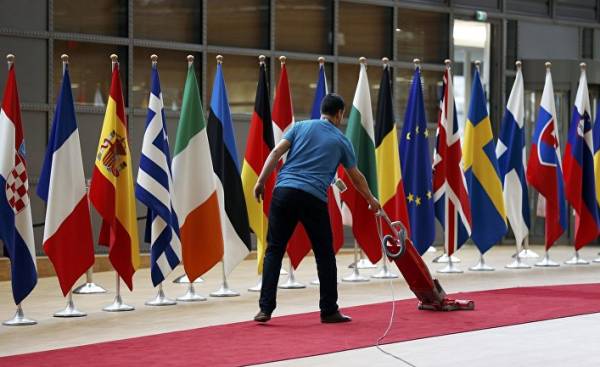
Started in Brussels on 9 March, the EU summit is intended to ensure the preservation of the European project. However, passed 6 March informal meeting of the heads of the major state established the idea of the existence of several Europe, which could further deepen the rift between East and West.
Atlantico: 9 March, representatives of the member States of the EU gathered in Brussels to ensure the safety of the European project after the impact, which was voting for Pexit last summer. However, rethinking the EU as several groups, apparently, is a priority option for the leaders of major States, if to judge on last March 6 the informal meeting of Angela Merkel, Francois Hollande and successor, Matteo Renzi. But is this state of Affairs, in fact, does not exist today?
The European Union today is rather geographic than a Federal Europe…
Christophe Buyo: Yes, indeed, if you look closely at the current European treaties, including a variety of additional protocols, can easily verify the existence of an installed them a large number of exceptions from the General rules. In some cases we are talking about minor details (such as access to the property for European citizens in some countries or the right to abortion or divorce), in others a much more serious moments. The most obvious difference within the EU, of course, is the existence of countries that have adopted the single currency (Eurozone), decided on the negotiations, forever to abandon it (UK and Denmark), are going in the future to switch to it (all others except Sweden), or would make, but apparently will not do it because of the disagreement of the people (Sweden). The second point concerns the defense: is NATO members and neutral countries, each with its understanding of neutrality. If we consider the situation in detail, it should be noted that in principle the primary European law (directives) must be implemented in all countries equally, but each of them makes the adjustments, not to mention those States that deliberately postpone the implementation of European law or not doing it fully.
In other words, the European agreement did not prevent the EU to maintain a number of national peculiarities. In addition, it is worth noting the existence of formal non-EU States, who nevertheless feel its impact in terms of law and public policy. This applies, for example, Switzerland, Norway and Iceland, as well as all of the countries-candidates for accession like the former Yugoslavia and Albania. Note also that the Schengen area is, paradoxically, includes Norway but not Britain. This is not to mention the existence of intergovernmental cooperation in all European countries outside the EU, which can serve as the European space Agency.
Anyway, need to remind that, in addition, so dear to the lawyers of diversity since 1957, there is a core of the European project with four freedoms of movement (goods, services, capital, people) to form a common market. Thus, the European project EU-primarily a liberal, not a Federal one.
— To what extent is the European project necessary for the survival of new ideas and results?
— One project “four freedoms” are certainly not sufficient for the unification of Europe.
Moreover, the consequences of these freedoms everywhere in the environment of low demand lead to a war of all against all in Europe. In particular increased competition in the labour market as a direct (immigration) and indirectly (displacement), irritating part of the European citizens. Voting for Pexit largely resulted from the perception of competition from European migrants on the British labour market as unfair and excessive. To build a “political community” is absolutely impossible in the conditions of fierce competition between its members, especially if the competition seems unfair and really does hurt people. The market may be a prelude to a political community only if it benefited all. So you need to get rid of the obsession with competition of all against all. The return of the idea that Europe needs a social and tax unification, reflects this conclusion. French or Italian would be very hard to love the European Union, if it meant for him the loss of the workplace in favor of Polish or Bulgarian.
Anyway reorientation in the direction of undistorted competition (as envisaged by the spirit of the original agreements) apply only to medium-term. The rules limit the social and tax dumping had already exist. But they are not. Even if tomorrow they will, they will bear fruit only in the medium term. But voters everywhere are waiting for the results now. First of all, this concerns economic growth and combat mass unemployment. But the EU’s position at this stage, frankly weak despite the ECB launched in 2012, monetary policy, economic recovery is extremely weak, especially in southern Europe. Thus, members of the European Union and especially the Eurozone must urgently in order to adopt a real policy of economic expansion. You need to set a goal of good jobs for all Europeans and to allocate greater resources to this. Only here whether it is capable of the current European leaders? Their past is causing this doubt…







